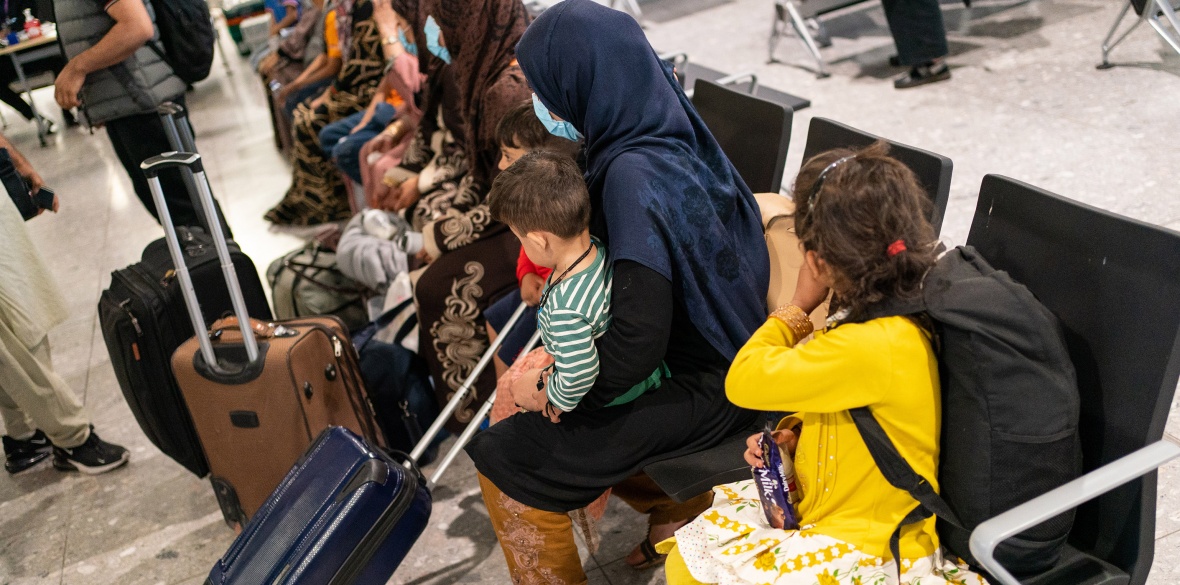This is the last article you can read this month
You can read more article this month
You can read more articles this month
Sorry your limit is up for this month
Reset on:
Please help support the Morning Star by subscribing here
WHAT a year this has been for refugees. Suffering all the misery of displacement, illegal travel, state brutality and discrimination, and demonised by right-wing politicians and media across the world, they are finding the borders of the richest countries closed.
The callous disregard for their fate displayed by governments has been formalised in a series of laws and directives which further endanger their lives, preventing safe passage at sea and encouraging those who might be expected to show some humanity to their plight to instead demonise them.
The death of 27 refugees crossing the Channel in a small dinghy was a crime facilitated by governments who all pander to the right in scapegoating refugees.
At the centre of this scapegoating is the idea that they are somehow taking advantage of a generous system by making their way to Britain in these terrifying ways, and that they are undeserving of any support.
Nothing could be further from the truth. The large majority of refugees are fleeing war in a range of countries, most of which have seen the direct involvement of Britain and the US.
They have spent years unable to live normal lives, see their children, have a proper education and are often displaced within their own countries.
Livelihoods have been destroyed, and the physical and mental impact of war, displacement and suffering are all too obvious.
The effects of war have been brought home to us this year by the defeat of the US in Afghanistan.
That war began 20 years ago, supposedly to root out terrorism but in reality waged against one of the poorest countries in the world — which remains so after two decades of occupation.
The war originally deposed the Taliban, but these same forces are now back in control of the country after the US withdrawal.
Afghans face a bleak winter — largely because of sanctions and the freezing of payments to the Taliban government, which only victimises the poor of the country.
While the defeat of the US led to these vindictive measures, there has been absolutely no admission from those who waged the war there, and then in Iraq, that they have done anything wrong.
There was much talk about accepting Afghan refugees in Britain — especially those who had worked for British troops — but little has been done.
Around the same time that the 27 drowned in the Channel, a group landed on the Kent coast, including Afghans who had been interpreters for the British army.
They had found it impossible to get there any other way. Many of those who drowned were Iraqi Kurds, fleeing from a country which has effectively been under Western protection since the 1990s.
A study led by David Vine of Brown University in the US last year found that “using the best available international data, this report conservatively estimates that at least 37 million people have fled their homes in the eight most violent wars the US military has launched or participated in since 2001.”
The study puts the figure for displaced persons since 2001 in Afghanistan at 5.3 million, Iraq at 9.2 million, Libya 1.2 million, Syria 7.1 million and Yemen at 4.4 million.
Not all these displaced persons become refugees, but many do, and most never get anywhere near the developed world.
Many are stuck in camps in places like Libya and Turkey, desperate to get to the EU or Britain, but denied this possibility and forced to continue to live in squalid and repressive conditions or to risk the costly and dangerous routes to northern and western Europe.
When we talk about the costs of war we tend to talk about deaths and injuries of direct participants or about the financial costs.
Both are a shocking indictment of a supposedly civilised society. The nature of warfare now is that with increasingly sophisticated technology the burden of death and injury falls on civilians.
The trillions of dollars spent on these wars are at the expense of healthcare, education and housing.
But there are far more costs of war. They destroy societies, with all the consequences for individuals and families, and they create levels of instability which prevent people being able to live anything approaching normal lives.
In this situation millions become refugees. This was recognised after the second world war, where huge numbers of people were displaced.
The laws governing the treatment of refugees and asylum-seekers were drawn up in the years after that war, affording protection to them under international law.
This protection is now being torn up by governments putting up walls and barriers to allowing them to reach safety and obtain a decent standard of living.
It is a shocking indictment of a government policy which repeatedly supports wars in the most reckless way but refuses to take responsibility for their consequences.
Lindsey German is convener of the Stop the War Coalition.









